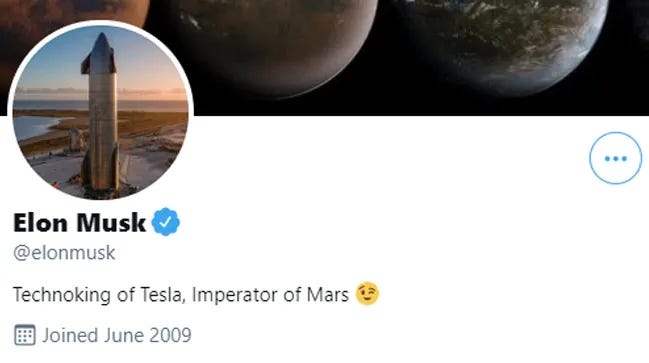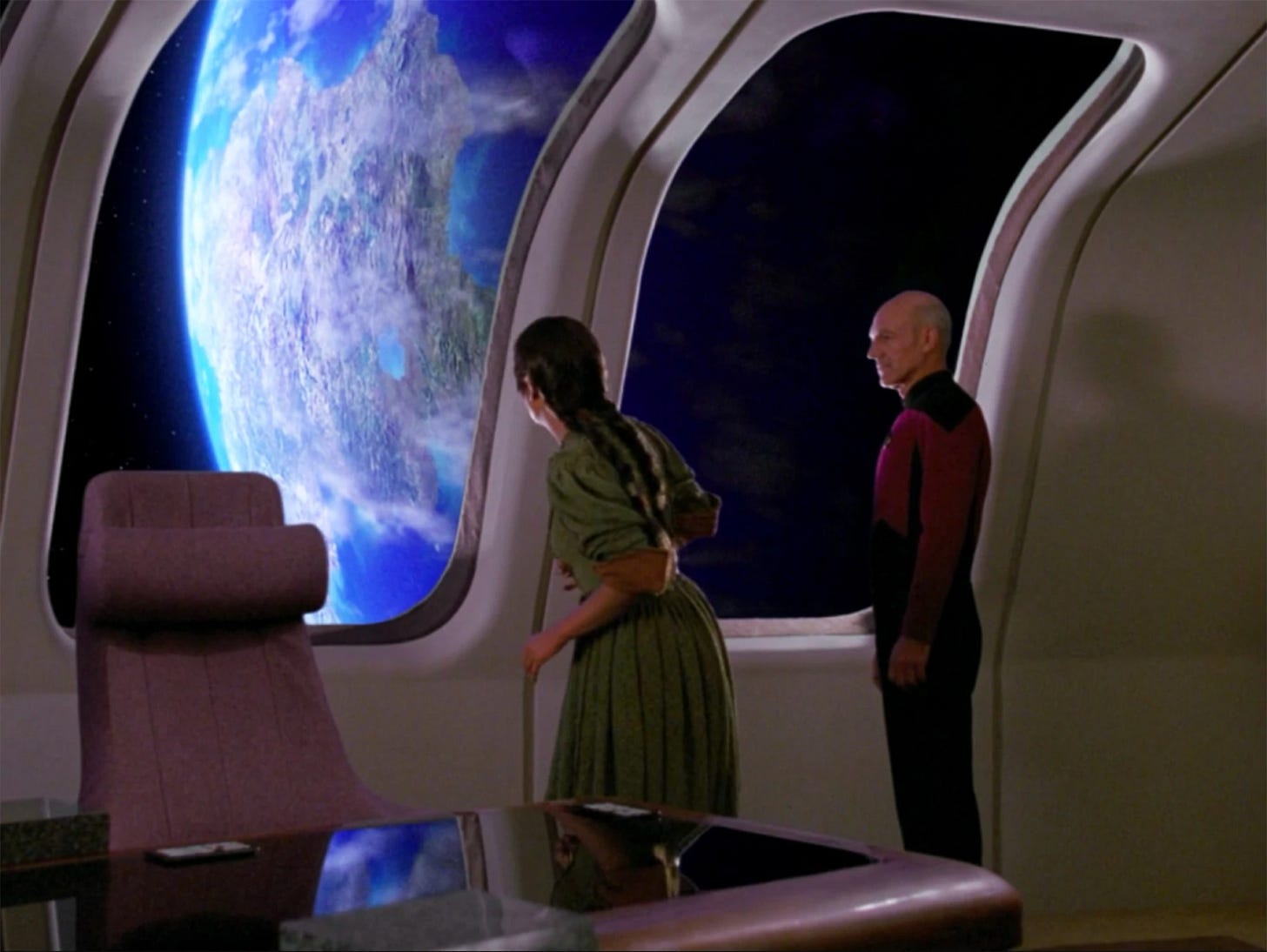Ecological freedom and voluntary servitude
The philosophical argument against space colonization
Readers asked me to lay out the central thesis of Against Mars (the book).
Here it is:
The myth of space colonization exists in the world to persuade us to renounce our freedom — in space, at some point in an undetermined future, but also in the present, right here and right now.
The big idea: Because it can neither be owned nor operated by anything or anyone, Earth’s biosphere gives us the material and physical possibility of freedom. Before it is a political right, freedom is an ecological phenomenon. Life in space inside constructed, mechanical replicas of Earth’s environment is the deliberate negation of that freedom.
We humans are social animals endowed of self-reflection, cogito ergo sum, and blessed with freedom, that is, the potential, the inclination and the desire for autonomy. Whichever way you define or understand freedom, the light of consciousness, free will, “life, liberty and the pursuit of happiness,” it emerges and rests entirely on one single, tangible and universal cause (at least universal for us) : Earth.
Earth’s biosphere, Earth’s environment and Earth’s gravitational pull provide the material substrate and the necessary preconditions for our experience of freedom, the great adventure of life. We have evolved on Earth, our bodies are exquisitely fitted to Earth’s environment or, I should say, to the terra firma. We humans are descended from pelagic creatures, but we are dwellers of the dry land.
Our shared milieu, the ecumene, consists of the thin band of dense air that extends from sea level to somewhere around 4,500 meters (15,000 feet). A prolonged sojourn at such elevations can lead to hypoxia, or oxygen deprivation syndrome. Even slightly lower altitudes can get rather uncomfortable: if you visited the summit of a mountain like Hawaii’s Mauna Kea (4,200 meters) you will know what I mean. Low air pressure is equally hostile to plant life, however a few species have adapted. The highest known plant is a moss that grows on mount Everest up to 6,500 meters, while the highest known flowering plant is Arenaria bryophylla, a Himalayan sandwort (observed at 6,200 meters or so).
Without the assistance of machines, humans (and a host of other terrestrial organisms) cannot survive in any environment that lacks gaseous air in adequate density. That includes the depths of the oceans, the altitudes at which planes fly and the immensities beyond Earth’s atmosphere.
At the same time, Earth’s environment, and the air we breathe, are the common goods that sustain us all. They are the geochemical and ecological prerequisites, the material bases not only for our physiological existence but for our freedom. However you may choose to construe freedom’s philosophical and practical attributes, Earth itself and Earth alone upholds and nurtures their possibility.
In that sense, Earth’s environment precedes and grounds human freedom. To breathe freely, thanks to Earth, is the right from which every other right springs.
To survive beyond the terra firma and its thin band of life-giving air, humans need mechanical apparatuses that replicate Earth’s environment.
From this, it proceeds that in order to be born, to live and to die in outer space, humans must renounce Earth and the possibility for freedom it bestows upon us. To colonize space, one must agree to voluntary servitude, and to pass that servitude onto his or her offspring who did not agree to it beforehand. Space colonization is alienation - at once transformation and loss.
Life in space, on Mars or anywhere else, requires absolute and definitive subservience to machines and to technology. Even the Emperor of Mars or the landlord of the orbital business park will find themselves in a relationship of complete dependence, and therefore servitude, to the machines they so heroically conjured. They are not free to take a morning stroll on the surface, let alone roam the wild beyond the walls of their fortresses. Without the breathing apparatus and the engineered replicas of Earth running smoothly, domes, habitats, space ships or space suits, they will die on the spot. Just as their lesser subjects and their underlings, they are imprisoned within their own devices.
Space colonizers are aware of this, if in a subliminal fashion. That is why they propose fantastical schemes of “terraformation” and Arcadian pictorials of space stations in orbit. To promote un-freedom, voluntary servitude by means of technology, they must appeal to people’s intuitive experience of ecological freedom, only possible on Earth.

As opposed to machines in space, nobody can lay any claim of property on Earth’s system and biotope. Some may claim local and temporary property on discrete pieces of land, on maritime areas, on underground lodes of minerals and so forth, but no-one can assert ownership over Earth’s atmosphere. The air we breathe is the common good, or public good, par excellence.
Conversely, any machine in space that replicates Earth’s atmosphere is necessarily the property of an entity, either a State, a corporation or a private individual. On Earth there can be no property of any kind, and therefore no sovereignty, public or commercial, over the air we all breathe. Inside space vehicles, the air we breathe is an intrinsic emanation of human coordination and human industry, an artifact of social relations and of political powers.

Earth’s atmosphere is beyond the reach of social appropriation, public or private, and it will remain so. The artificial atmosphere inside space machines is the technological appropriation of that which cannot be appropriated on Earth.
Humans, like all Earth-bound lifeforms, are alive owing to their symbiotic relationship with the Earth. From cyanobacteria to humans, all life participates in Earth’s endless cycles of chemical exchanges. While confined and bounded, symbiosis is not a prison, and certainly not one of our own making.
Therefore, it derives logically that life in space, aided by mechanical implements and severed from our symbiotic exchanges with the Earth, is orders of magnitude more confined and bounded than life on Earth.
The machines that replicate Earth’s environmental conditions are, by their very nature, instruments of political sovereignty. As such, they drastically constrain what I would call our fundamental, pre-political freedom, or its possibility - the ecological freedom that arises from our symbiotic relationship with our planet.
Even if the hypothetical spaceships were to be collectively owned by and operated on behalf of some kind of equally hypothetical interplanetary Socialist Federation, they would still be, in effect, prisons. You are not free to walk off the Enterprise. There is no outside. Utopia is not found in outer space.
Symbiosis with the Earth system is an exchange, not a subjugation nor an alienation. Life-support systems in space that mimic Earth, however amazing and well-designed, consign those who elect to live inside of them to a relationship of absolute, life-or-death dependence.
We certainly are in a similar relationship of life-or-death dependence with Earth (and we should be more cognizant of that reality, and govern ourselves accordingly). The signal difference is that we did not create nor engineer that dependence, it is the overarching parameter of our lives, it is given to us with no strings attached. In consequence, it cannot be withdrawn from us by some unfortunate mechanical failure, nor by the fiat of the Emperor of Mars in a fit of petulance.
As the result of evolution, we humans are biologically and ecologically tied to Earth in ways that we have only begun to comprehend. That symbiosis gives us the possibility of freedom. For better and for worse, that possibility comes with a hard physical limit: the thin, 4.5 kilometers film of breathable atmosphere that envelops the surface of the Earth.
Any artificial replica of that symbiosis necessarily negates the possibility of freedom.








This also implies that any attack on our symbiosis here on Earth is an attack on our freedom— polluters beware!
You should consider engaging with the fictional series (books are better but the adaptation to TV is good too) "The Expanse" since it touches on the sociological dynamics generated by dependency on machines, etc.